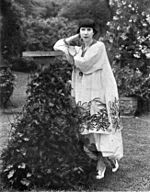Florine Stettheimer, Date of Birth, Place of Birth, Date of Death
TweetFlorine Stettheimer
American artist
 Date of Birth: 29-Aug-1871
Date of Birth: 29-Aug-1871
 Place of Birth: Rochester, New York, United States
Place of Birth: Rochester, New York, United States
Date of Death: 11-May-1944
Profession: painter
Nationality: United States
Zodiac Sign: Virgo 
About Florine Stettheimer
- Florine Stettheimer (August 19, 1871 – May 11, 1944) was an American modernist painter, feminist, theatrical designer, poet, and salonnière. Stettheimer developed a feminine, theatrical painting style based on the avant-garde personalities and experiences of newly modernist New York City.
- She painted the first feminist nude self-portrait, executed paintings depicting controversial issues of race and sexual preference, depicted the leisure activities and parties of her family and friends, and, with her sisters, hosted a salon renowned for attracting influential members of the avant-garde.
- In the mid-1930s, Stettheimer achieved international acclaim for her stage designs and costumes (using the innovative material cellophane) for Gertrude Stein and Virgil Thomson's avant-garde opera, Four Saints in Three Acts.
- She is best known for her four monumental works illustrating what she considered to be New York City's "Cathedrals": Broadway, Wall Street, Fifth Avenue, and art museums. During her lifetime, Stettheimer exhibited her paintings at more than 40 important museum exhibitions and salons in New York and Paris.
- In 1938, when the curator of the Museum of Modern Art sent the first exhibition of American art to Europe, Stettheimer and Georgia O'Keeffe were the only women whose work was included.
- Following her death in 1944, her friend Marcel Duchamp curated a retrospective exhibition of her work at the Museum of Modern Art in 1946.
- It was the museum's first retrospective exhibition of work by a woman artist.
- After her death, Stettheimer's paintings were donated to major museums throughout the United States.
- In addition to her many paintings and costume and set designs, Stettheimer designed unique frames for her paintings and matching furniture, and wrote humorous, often biting poetry.
- A book of her poetry, Crystal Flowers, was published privately and posthumously by her sister Ettie Stettheimer in 1949.
Read more at Wikipedia

